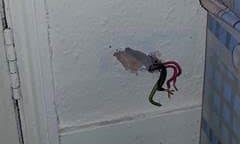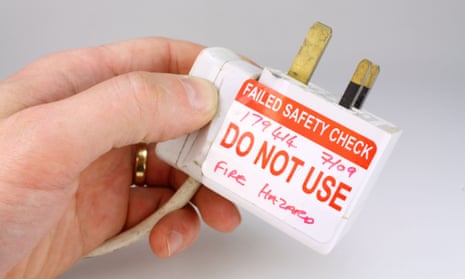“I was in the shower, reaching for the soap when I felt a painful sensation vibrate through my body,” says Campbell*, 20, a student at the University of Warwick. “I got out of the shower immediately, realising I had received an electric shock. I was shaken up. My whole body ached for days afterwards.”
Campbell is not the only student to experience electrical problems in a privately rented house, according to research by safety charity Electrical Safety First, published on Tuesday.
The survey, carried out by the charity and assisted by the National Union of Students (NUS), found that 27% of the 1,161 student respondents say they have experienced dangerous electrical problems. Of those who reported issues to a landlord or letting agent, hundreds say they were ignored.
When Campbell told his letting agent that he had had an electric shock, they were reluctant to act, he says. “Eventually we started using the shower again, but we were nervous about it to begin with. Two months later my housemate had the same experience. This time when we reported it to the agent and we didn’t let it go. But it still took over a month for them to replace the unit.”
Of those who had found and reported exposed wiring, which can deliver a lethal electric shock, 37% say they were not helped by their landlord, while 35% of those who experienced damp, condensation or flooding around electrics also say the problem was left unresolved.
Other problems reported were electric shocks , scorchings around sockets and broken light switches.
Emma Apter, head of communications at Electrical Safety First, says: “These figures are unacceptable and suggest that poor landlord practice is putting lives at risk.
“Our message to students is this: you do not have to accept living in substandard or dangerous accommodation. Inform your landlord or letting agent straight away if any hazards arise and if they fail to act then your local authority is there to assist.”

Sarah, 24, studying in Middlesex and also living in privately rented accomodation, says: “My dishwasher flooded the kitchen and I couldn’t do anything to stop the water coming in from the pipe. I called the letting agent’s emergency contact line and they said they couldn’t get a plumber out on a Saturday.
“They asked me to pull the dishwasher out and unplug it from the socket. The power cord and socket were both wet from the flooding so I was concerned about doing this, but felt I had no choice. It’s been over a year and no one has come to repair the dishwasher or check that the flooded electrics are safe to use.”
Shelly Asquith, NUS Welfare Officer, says: “It’s absolutely appalling that students are being put at risk of serious harm by landlords and letting agents who are willing to charge above and beyond for substandard and unsafe properties.
“Students should be able to focus on studying and enjoying their educational experience instead of worrying about whether turning on a light switch or plugging in a toaster could kill them. This prioritising of profit over safety is just another example of how students across the country are being taken for a ride by greedy housing providers.”
A report by the National Union of Students (NUS) last year found that over three quarters of students have problems with their privately rented accommodation. According to the report, over half have condensation, almost half have mould and a quarter have vermin – from slugs to mice.
Despite these problems, three quarters of students go into debt to cover the upfront costs of securing a student home, from deposits to letting agency fees.
- Students asked that we did not use their full names to identify them.
Keep up with the latest on Guardian Students: follow us on Twitter at @GdnStudents – and become a member to receive exclusive benefits and our weekly newsletter.

Comments (…)
Sign in or create your Guardian account to join the discussion